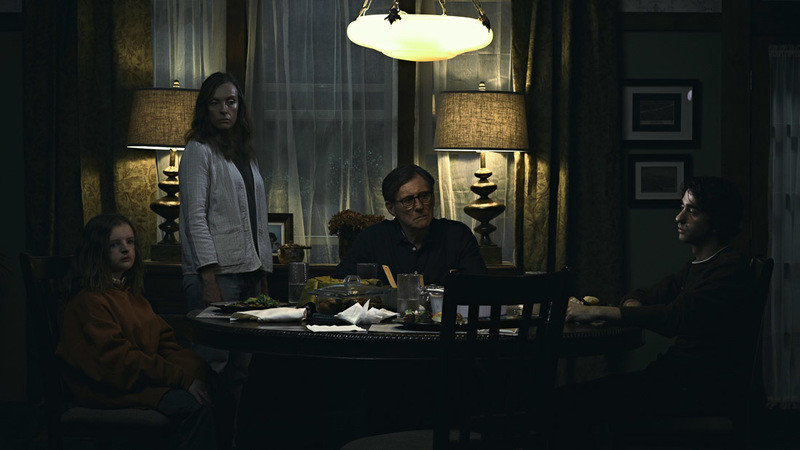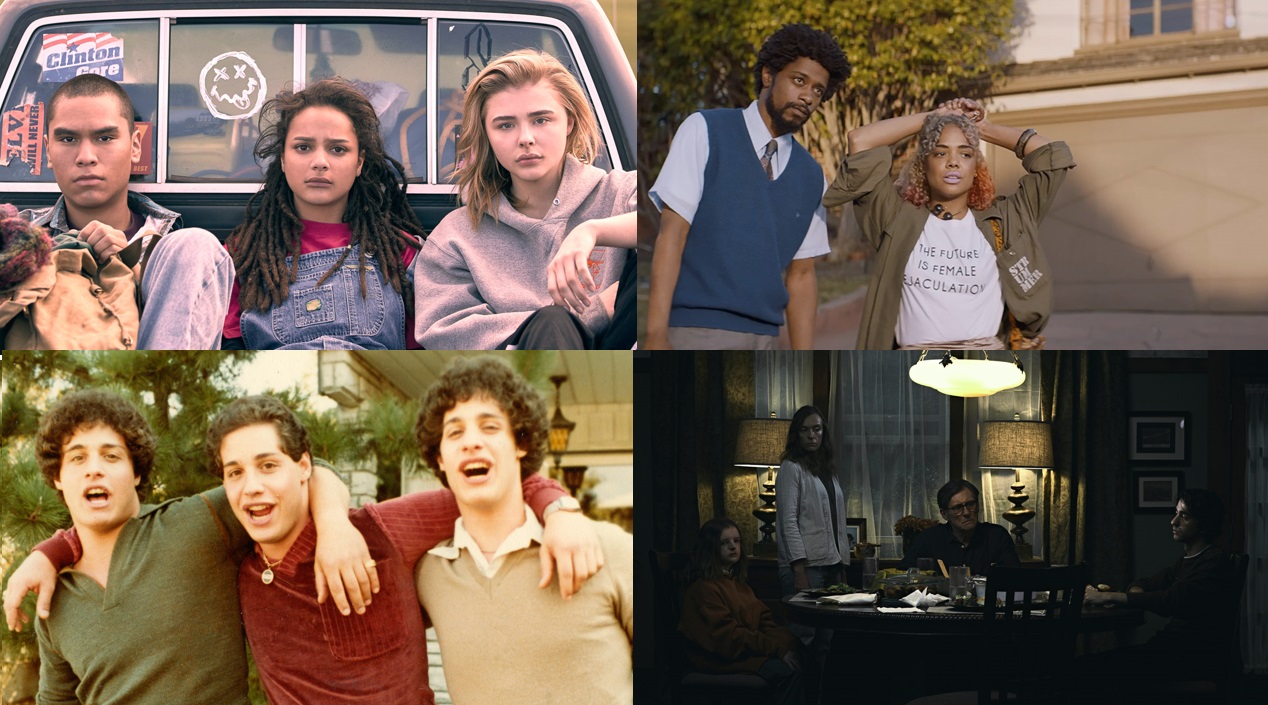While the general consensus was that 2018’s Sundance was a “good-not-great” edition of the annual event, there was plenty of “good” to go around. Our quartet of contributors that braved the Park City weather and long lines for premiere screenings had no problem coming up with a dozen films that you should put on your Letterboxd watchlist. And it’s telling that these films came from multiple programs of this year’s festival, including U.S. Dramatic Competition, Next, and even a couple Midnights. There may not have been a lot of “great” to go around this year, but there was “good” everywhere you looked, especially in these twelve films.
“Blaze”
“Blaze” was a wonderful, alternative choice in Sundance’s highly competitive US Dramatic category, and I’m sure it will play exceptionally well in March at Austin’s SXSW film bash. But this is a movie that doesn’t easily fit into the standards of any festival. Instead it transports viewers inside the tender, romantic soul of a song by its namesake, the underrated country singer/songwriter Blaze Foley. From the very beginning, director Ethan Hawke’s film does not have the same beats of a typical musician movie, and its ear for music, its eye for visual storytelling and its attitude toward humanity make for a gorgeous spectacle, albeit for a musician many are not familiar with (and they will be). Ben Dickey’s performance as Foley, which received a special acting prize from a jury that included Michael Stuhlbarg and Octavia Spencer, is just the first of its many treasures. Like Foley himself, it’s a movie of its own exquisite tenderness and lyricism, with an overall warmth that only comes from such self-assured, sincere artistry. (NA)

The buzz after Ari Aster’s world premiere was that Sundance had produced its first horror great since “The Witch,” but midnight buzz is often a bit, shall we say, genre-biased, and films often sink when they play in the daylight. “Hereditary” works anywhere, anytime. It is a truly unsettling, terrifying, emotionally devastating film that actually derives much of its strength from how it resembles a traditional Sundance family drama—its core story of a family collapsing after unimaginable loss could have come right out of the Sundance Institute—before, well, all Hell literally breaks loose. “Hereditary” is the kind of “strap in and hold on” horror film that will make you sleep with the lights on. (BT)
“Leave No Trace”
Seven years after “Winter’s Bone,” writer/director Debra Granik returned with an even-better drama about a father and daughter who live on public land outside of Portland, Oregon. He has PTSD that keeps him “restless” in everyday life, but his daughter, in a revelatory performance by Thomas Harcourt McKenzie, is growing up before his eyes. As society keeps trying to grab this pair and give them shelter and stability, we watch what it does to a previously-strong union, and we feel the emotions simmering underneath. It’s a beautiful, heartfelt, true film that makes us hope that Granik doesn’t take another seven years to make another one. (BT)
“Mandy”
Unless director Panos Cosmatos and Nicolas Cage team up again, there will never be another Midnight movie quite like “Mandy,” which only started its cult following at Sundance. Cosmatos’ dedication to his bombastic, ‘80s-centric style makes for the most psychedelic of slow burns in the first half of this revenge thriller, but then the movie explodes a million times over when Cage takes center stage. As “Beyond the Black Rainbow” director Cosmatos reinvents himself right before our eyes as a high-voltage action filmmaker, Cage ascends to status of Midnight movie god in one amazing (and amazingly gory) battle after the next. Even the weapons in “Mandy” will inspire more giddiness than the running time of most cult classics. “Mandy” is supreme entertainment that is humbly not of this Earth, a highway to Hell made possible by the heavenly combination of a refreshingly bonkers director and a legendarily nuttier lead actor. (NA)

“The Miseducation of Cameron Post”
Fans of “Appropriate Behavior” won’t be disappointed in Desiree Akhavan’s sweet, compassionate yet brutally honest film about surviving gay conversion therapy. Adapted by Akhavan and Cecilia Frugiuele from Emily M. Danforth’s acclaimed book, “The Miseducation of Cameron Post” (Winner of the Grand Jury Prize, US Dramatic) follows Cameron, as she gets caught making out with another girl on prom night and is sent off to a conversion center by her conservative family. Akhavan follows the lives of these manipulated outcasts in a quietly hostile environment with accumulating wisdom, as some of them manage to break free and others prove to be not as lucky. With pitch-perfect performances from Chloë Grace Moretz, Sasha Lane and Jennifer Ehle (who channels the bone-chilling Nurse Ratched), “The Miseducation of Cameron Post” is the film of acceptance and understanding we need today. Let’s hope the MPAA goes easy on this one, enabling young teens coming to terms with their identity everywhere to see it. (TL)
“Private Life”
I am trying to remember the last time I submitted myself completely to the bighearted moments and luxuriant rhythms of a familial drama, before Tamara Jenkins’ boundlessly generous “Private Life”. And I immediately think of the films of Kenneth Lonergan. Jenkins’ elegant film (which she wrote and directed) follows the life of a reproductively challenged 40-something couple (Kathryn Hahn and Paul Giamatti, a soon-to-be-legendary screen duo) and their loving yet directionless niece Sadie (Kayli Carter) who agrees to donate her eggs to her “art parents”. Infused with humor, frustration and most importantly love in its every turn; “Private Life” miraculously gifts the viewer an empathetic lens to a painful battle, usually whispered, rarely openly discussed. Ignore the “it can be shorter” crowd. This film is as long as it needs to be. Personally, I couldn’t get enough of Jenkins’ wit and wisdom that seeped out of all her characters. (TL)
“Shirkers”
Aside from trying to get the public WiFi to work, my second biggest hobby at Sundance this year was babbling to fellow fest-goers about “Shirkers,” a World Cinema Documentary entry that rightfully won a special Directing prize this past Saturday. It takes roughly two minutes to get completely sucked into the true-life filmmaking odyssey of Sandi Tan, whose life-story is bound to make for somebody’s new favorite movie. Here, she tells of a narrative film that she made with her friends, as a badass, film and music-loving teenager, living in Singapore in the ‘90s. The project was called “Shirkers,” and in the sad tradition of film history, she had her efforts virtually erased by a man, a director who disappeared with all of the film reels before it was cut together. Now, “Shirkers” is the name of her documentary that tells of this fascinating project, her pursuit of cinema after such a trauma, and what happened when the reels were proven to not have vanished after all. The filmmaking here alone, vivid with intricate visual details and unmistakable rhythm, makes the movie a complete joy. Tan beautifully crafts each distinct part of this dazzling tapestry made from a woman’s love for filmmaking, while sharing one of those fascinating, infectious true-life stories that has to be seen to believed. (NA)

“Sorry to Bother You”
Comedies are so rare at Sundance, that many folks might approach them with some sense of skepticism. Although divisive, Boots Riley’s “Sorry to Bother You” is the clear winner of this year’s crop of funny movies. The film is a bizarre social satire that covers unions, exploitation, slavery, capitalism and code-switching. Lakeith Stanfield plays Cassius Green, a minimum wage worker who’s offered a promotion at his shady company, but his success comes at the price of taking advantage of his friends and other people of color. The film’s amazing cast includes Terry Crews as Cassius’ uncle and landlord, Steven Yeun as an undercover union organizer, Armie Hammer as a psycho Jeff Bezos, and Tessa Thompson as Cassius’ supercool outspoken girlfriend. “Sorry to Bother You” is both witty and visually hilarious, occasionally dipping into surrealism to get its message across. (MC)
“The Tale“
There were plenty of films at this year’s Sundance that dealt with sexual abuse or harassment, but none were as poignant as Jennifer Fox’s harrowing journey to unearthing an old trauma. In this hybrid confession and fiction, a 13-year-old Jenny spends the summer at her riding instructor’s home where she’s introduced to a running coach who manipulates her trust in order to sexually assault her. There’s no sugarcoating “The Tale.” The film is a chilling work that can be difficult to watch and painful to remember, but it’s an unforgettable movie about the stories we tell ourselves to survive. As an adult, Jenny (played by an incredible Laura Dern) refuses to be defined as a victim. Like so many people in our lives, she’s buried her pain in the past and forged ahead. Her assault does not define her, but it has shaped her. The final scene of this movie is a cathartic heartbreaker: the culmination of righteous anger, forgiveness and coming to peace with your past. (MC)

“Three Identical Strangers”
Be warned: it’s better to go into “Three Identical Strangers” (winner of US Documentary Special Jury Award for Storytelling) without knowing the story. The year is 1980, and to our astonishment, three strangers—named Bobby Shafran, Eddy Galland and David Kellman—are about to discover that they are identical triplets, separated at birth after being given to different families through an adoption agency. It’s all fun and games for a while for the trio, as they become America’s sweethearts, business partners, and life of every New York party they’re invited to. But then, the truth about their separation inevitably comes out. Through reenactments, archival footage and talking heads interviews, Wardle treats his thrilling documentary as an intricate detective story. He involves his audience in every discovery step by step, revealing not only a heartbreaking tale of familial tragedy, but also an unsettling account of corruption, with disturbing parallels to historically catastrophic human greed and misjudgment. (TL)
“We the Animals”
Three brothers, each just a few years apart, cling to each other to survive a tumultuous moment in their parents’ rocky marriage. While “We the Animals” follows the brothers’ adventures and struggles, the youngest, Jonah (an amazing Evan Rosado) becomes the movie’s focus. It’s hard to single out just one great aspect of this movie. The cast is close and tight-knit, not unlike a family, and the performances are extraordinarily moving. But the standout aspect is the movie’s cinematography. “We the Animals” looks unlike any other movie I watched at Sundance. Shot on 16mm, the images appear as if they were created by rich oil paints with dark undertones. The effect makes Jonah’s world seem scarier at times but also dreamier as his reality slips away into animated sequences of his drawings. This movie is so gorgeous, it even makes drone footage look ethereal rather than pedestrian. (MC)
Haunting is the best word to describe Lynne Ramsay’s adaptation of the Jonathan Ames book, a multiple award-winner from the 2017 Cannes Film Festival that made its North American premiere in Sundance this year, in advance of an April release from Amazon. Joaquin Phoenix stars as a suicidal, possibly insane assassin who ends up burned after he gets involved with the rescue of a politician’s daughter from a sex trafficking ring. Like “Drive” and “Taxi Driver,” this ultra-violent thriller oozes style but Phoenix’s daring work grounds it in something more tragic and relatable. It’s going to be the kind of film that has everyone talking when it finally lands in theaters. (BT)











